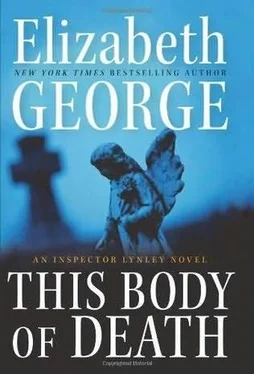“Why did you lie to the other officers, Mr. Langer?” Lynley asked him without preamble. “You must have known everything you said would be checked.”
Langer made no reply to this. Wise man, Lynley thought. He was waiting for more.
“There are no ex-wives. Nor are there children,” Lynley said. “Why lie about something so easy to disprove?”
Langer took a moment to tear open two packets of sugar, which he dumped into his coffee. He did not stir it. “It’s nothing to do with what happened to Jemima. I’ve nothing to do with that.”
“Yes, but you’d say that, wouldn’t you?” Lynley pointed out. “Anyone would.”
“It’s a matter of consistency. That’s all.”
“Explain.”
“I tell everyone the same. Three ex-wives, children. It keeps things simple.”
“That’s important to you?”
Langer looked away. From where they sat, the ice rink was visible: all the lovely young things flying about-or otherwise-in their colourful tights and skimpy skirts. “I like to remain uninvolved,” he said. “Ex-wives and children help, I find.”
“Uninvolved with whom?”
“I’m an instructor. That’s all I do with them, whatever their ages. Sometimes a young one or a middle-aged one or any of them develop an interest because we’re close on the ice. It’s stupid, it doesn’t mean anything, and I don’t take advantage. Ex-wives make that possible.”
“With Jemima Hastings as well?”
“Jemima took lessons from me,” Langer told him. “That’s the extent of it. She used me, rather.”
“For what?”
“I told the others this already. I wasn’t lying about that. She wanted to keep her eye on Frazer.”
“She phoned you on the day she died. Along with the truth about ex-wives and children, you didn’t mention that to the other detectives.”
Langer took up his coffee. “I hadn’t remembered the call.”
“And do you now?”
He looked reflective. “Yes, actually. She was looking for Frazer.”
“Was she supposed to be meeting him at the cemetery?”
“I rather think she was checking up on him. She did that often. Anyone Frazer was involved with ended up doing that. Jemima wasn’t the first and she wouldn’t have been the last. Long as he worked here that went on.”
“A woman checking up on him?”
“A woman, who didn’t quite trust him, making sure he was walking the straight and narrow. He rarely did.”
“And for Jemima?”
“It was likely business as usual for Frazer, but I don’t know, do I? Anyway, I couldn’t help her that day, which she ought to have realised before she rang me.”
“Why?”
“Because of the time. He isn’t here at that hour. Had she thought about it, she would have known he wouldn’t be here. But he wasn’t answering his mobile, she said. She’d rung him a few times and he wasn’t answering and she wanted to know was he still here, where, perhaps, he wouldn’t be able to hear it with all the noise.” He indicated the clamour round them. “But really, she had to have known he’d already left for home. Anyway, that’s what I told her.”
For home, Lynley thought. “He didn’t go from here directly to Duke’s Hotel?”
“He always goes home first. He says he doesn’t like to keep his Duke’s kit here where it could get dirty, but knowing Frazer, there’s another reason.” He made a crude gesture with his hands, an indication of sexual intercourse. “Likely he’s been doing the job on someone en route, between here and Duke’s. Or there at home, even. It wouldn’t surprise me. That would be his style. Anyway, Jemima said she’d been leaving him messages and she was feeling panicky.”
“She used that term? Panicky?”
“No. But I could hear it in her voice.”
“Was it fear perhaps? Not panic, but fear? She was phoning from a cemetery, after all. People are sometimes frightened in cemeteries.”
Langer shrugged off this idea. He said, “I don’t think that’s what it was. ’F you ask me, I think it was dread of having to look squarely at something she’s been denying.”
Interesting point, Lynley thought. He said, “Carry on.”
“Frazer,” he said. “I expect she wanted very much to think Frazer Chaplin was the one, if you know what I mean, the one in inverted commas. But I expect in her heart she knew he wasn’t.”
“What makes you draw the latter conclusion?”
Langer smiled thinly. “Because it’s the conclusion they always reached, Inspector. Every last woman who hooked up with the bloke.”
THUS LYNLEY GREATLY anticipated meeting the male paragon he’d been hearing about. He made his way to St. James’s Place, a nearly hidden cul-de-sac where Duke’s Hotel formed a stately L of redbrick, decorative ironwork, oriel window, and sumptuous swaths of ivy tumbling from first-floor balconies. He left the Healey Elliott under the watchful eye of a uniformed doorman and entered into the reserved hush one usually encounters in places of worship. Could he be helped? he was asked by a passing bellboy.
The bar, he replied. An immediate smile of recognition: Lynley’s possession and use of the Voice would make him eternally welcome in any establishment where people spoke in murmurs, called employees “the staff,” and had the good sense to drink sherry before and port after. If the gentleman would come this way…?
The bar ran heavily to naval portraits and prints of ruined castles, with a painting of Admiral Nelson in his post-arm days taking a predominant position, as one would expect of a sea-oriented décor. The bar comprised three rooms-two of which were separated by a fireplace in which, mercifully, no fire was burning-and it was furnished with upholstered armchairs and round, glass-topped tables at which were gathered mostly business people at this time of day. They appeared to be tossing back gin and tonics, with a few hardier souls getting glassy-eyed over martinis. This was apparently the signature drink of one of the bartenders, an Italian man with a marked accent who asked Lynley if he wanted the speciality, which-he was told-was neither shaken nor stirred but rather bruised along into some sort of miraculous nectar.
Lynley demurred. He said he wouldn’t mind a Pellegrino, if they had it. Lime and no ice. And was Frazer Chaplin available for a chat? He produced his identification. The bartender-who bore the unlikely non-Italian name of Heinrich-gave no reaction at all to the presence of a policeman, in possession of a cultured accent or not. Indifferently, he said Frazer Chaplin had not yet arrived. He was expected-with a glance at an impressive watch-in the next quarter hour.
Did Frazer work regular hours? Lynley enquired of the bartender. Or did he, perhaps, just fill in when things were busy in the hotel?
Regular hours, he was told. “Wouldn’t have taken the job otherwise,” Heinrich said.
“Why not?”
“Evening shift is busiest. The tips are better. So are the customers.”
Lynley raised an eyebrow, seeking elucidation, which Heinrich was happy to give him. It seemed Frazer enjoyed the attention of various ladies of varying ages who frequented the bar at Duke’s Hotel most evenings. These were international businesswomen generally, in town for one reason or another, and Frazer was apparently willing to give them additional reasons to hang about.
“Has an eye out for a lady who’ll keep him how he wants to be kept,” was how Heinrich put it. He shook his head, but his expression was unmistakably fond. “Fancies himself a gigolo.”
“Is that working for him?”
Heinrich chuckled. “Not yet. But that’s not kept the lad from trying. He wants to own a boutique hotel, just like this place. But he wants someone else to buy it for him.”
Читать дальше












